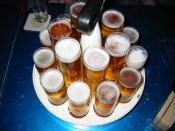Having an addiction, whether it is to alcohol, drugs, gambling, or even food, can cause physiological or psychological dependence on a substance or activity, and can be connected to illnesses such as diabetes and cardiovascular disease. A physiological dependence means that the body has become accustomed to a drug or drugs and needs these chemicals just to function, making the body crave these substances. Physiological dependence is determined when a person experiences tolerance, or when the body becomes used to the effect of the drug, and then withdrawal, when a person stops taking a drugs making them physiologically dependant. However, psychological dependence is when a person depends on the feeling received from a drug, which involves denial, or that the addict does not admit or realize that they are in trouble with drug abuse or alcoholism, and they think they can control the use of drugs and alcohol without harm, but they cannot.
The process of addiction has many gradual changes: they first use it and like the feeling, so occasionally use it in social settings, then they begin to have occasional trouble with the drug: showing mood swings and personality changes, out drinking others without seeming drunk, and using violence and high-risk behaviors. The third step to addiction is a regular use of the drug: finding that tolerance increases, needing more and more, trying to control usage but cannot, feeling guilty after episodes, hanging out with others who use drugs and drink, and denying that there is a problem when others suggest drug or drink usage issues. Fourth, multiple drug use occurs: combining or switching drugs for new and stronger effects or to assure supply, becoming hooked on more than one kind of drug, then fifth, increasing dependency, needing drugs to function, to stop shaking, or feeling sick, but...


